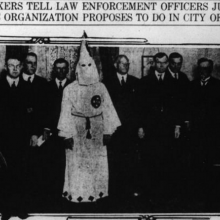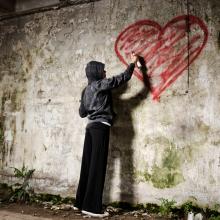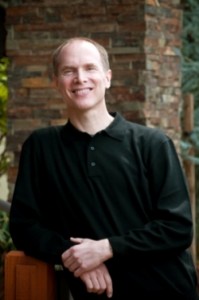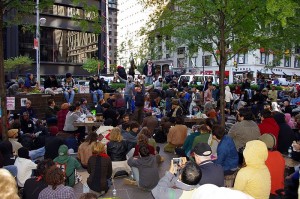Portland
Ambitious in scope, The Place We Make is part cultural and geographic history, part spiritual memoir, with thoroughly researched original source documents and contemporary voices. The structure of the book alternates between historical profiles from Vanderpool’s context and Sanderson’s personal moves from the places of ignorance, silence, and exclusion toward empathy, self-disclosure, and community. It is no small task to write as a confessional Christian while clearly identifying the numerous ways Christianity has served to create and perpetuate white supremacy. Sanderson tackles this challenge with humility, often citing theologians and Christians of color who have been wrestling with this paradox from the beginning of colonial modernity.
I barely slept the night of the stabbing. It was a hot night, and I could hear the train tracks through our open windows. The last time I slept (or didn’t sleep) like that was election night. It was freezing, the windows closed, but the same nauseating dread kept my head buzzing, my jaw locked, my eyes open. Except that on election night it was the fear of the world I would wake up to that kept me awake. Now we know exactly what that world looks like.
A man facing murder charges, after he allegedly fatally stabbed two people and injured another on a Portland light-rail train, has a history of run-ins with law enforcement, and is a self-proclaimed white supremacist, authorities said.
Jeremy Joseph Christian, 35, is charged with aggravated murder, attempted murder, intimidation in the second degree, and felony possession of a restricted weapon, stemming from the May 26 attack. Christian makes his first court appearance on May 30.
The United Methodist Church will hold a special session of its General Conference to settle questions of LGBTQ inclusion that have vexed the global denomination for years.
The announcement came on April 25, the same day the denomination’s highest court held a hearing on whether an openly gay pastor can serve as bishop.
The General Conference, the United Methodist Church’s top legislative body, typically meets every four years. At last year’s meeting in Portland, Ore., it voted to defer all decisions about human sexuality to a specially appointed commission and left the door open for a special session.
In January 2016, the Rev. Cynthia Meyer told her United Methodist Church congregation she felt “called by God to be open and honest” about who she is: “a woman who loves, and shares her life with, another woman.”

Image via Christ Church: Portland Facebook
A new short documentary, "What Happens When an Evangelical Church Welcomes LGBTQ Members," features Rev. Adam Phillips, a pastor in Portland, Ore., whose church was kicked out of the Evangelical Covenant Church denomination in 2015 when Phillips revealed his full acceptance and support of the LGBTQ community.
"I hadn't really grown up in a faith community, and the Covenant Church was my faith family," he says. "I poured myself into it, and for a long season they poured themselves into me. I was one of the young emerging leaders...to be the future leaders of the church."

Image via Emily McFarlan Miller / RNS
The debate — over how to debate the rules — became so convoluted that at one point Missouri delegate Margie Briggs called for prayer and said:
“I believe we are confusing God at this point.”
While black churches have long led the charge against racism, the white Christian community has largely held back, says author Jim Wallis.
He's on a nationwide mission to change that, including in Portland.
Wallis's newest book, "America's Original Sin: Racism, White Privilege, and the Bridge to a New America," is an indictment of white Christian apathy and inaction towards systemic racism. We interviewed Wallis about the book last week.

Image via Twitter
Did you know that Oregon was founded as place for white people only?
Yes. Yes, it was.
In a complicated twisting political tale of pre-Civil War American history, enshrined in my state’s constitution were explicit and clear black exclusion laws.
What’s it like to share your stories of loss to a room of hundreds? Wm. Paul Young (author of The Shack), Reba Riley (Post-Traumatic Church Syndrome), and Christian Piatt (PostChristian) are about to find out — and help others do the same. The three bestselling authors are launching a two-stop tour — "Where's God When..." — in Seattle and Portland on May 16 & 17, to help others hear, and share, their own stories of grief, heartbreak, and healing.
Sojourners sat down with the authors last week to talk loss, return to faith, and what it’s like to coordinate a tour focused on hard questions about God. Interview edited for length and clarity.
Sojourners: What’s your hope for the ECC broadly? I’m not sure whether you can even speak to this yet, but are you hoping to stay within the denomination? What’s your hope for where this conversation leads the church?
Phillips: Well, I just, I deeply love the Covenant Church. I keep using “we” language instead of “us” and “them” language, because it really hasn’t sunk in yet. And there’s some confusion around, how do I operate as an ordained minister in a former Covenant church plant. For me, this all comes back to our Covenant pietistic roots about relationship, new life in Christ, and reading the bible together.
I’ve just met dozens and dozens and dozens of gay Covenanters in recent weeks that have said, hey, thanks for speaking up, and they’ve told me their stories of exclusion or being ostracized in some cases. These are good Christian people — people that grew up in the Covenant, working at Bible camps, going to Covenant schools. And some of these folks have experienced depression; some have experienced suicidal thoughts. And that’s the kind of thing that I hope that my friends in the Covenant, no matter where they stand on this matter, can work together to at least find some way for hospitality and inclusion to take place.
You know, I never thought that the Covenant needed to change its policies to become an open and affirming church. I was simply hoping that we could hold in tension this kind of historic covenant agreement to disagree on matters that weren’t what some would call “essential matters” — like resurrection, like new life, like the presence of the Holy Spirit. I have dear friends in the covenant that wouldn’t hold my position, and they’re doing amazing work in ministry — alongside the gay community, even — so you know, I hope that we can find some way forward that can get beyond this moment of confusion.
Sojourners: Many churches and Christian organizations in the U.S. right now are afraid to take a stand on LGBTQ rights precisely for this reason — whether it’s a hesitancy to break with denominational tradition or, maybe more pragmatically, a fear of getting defunded. For someone newly in this chaos, do you have any wisdom from having this happen to you?
Phillips: I think it’s imperative that we lean into what the Holy Spirit is doing. I think the Holy Spirit is guiding us on this conversation — and there’s so much grace. Even though there’s so much pain and fear. I think in the end, grace wins out.
I’ve found that in the midst of all this, amazing friends emerge, and new friendships are forged. And you know, God’s doing something really cool right now. And it seems chaotic, and it seems scary, because so many of the old models are outdated. But God’s truth is not changed whatsoever, and God’s news is still good. So I just encourage people to keep leaning into God’s promises and friends along the way that can walk with us as we figure it out as we go.
Living in a different time zone, I was not able to watch the live coverage of the Golden Globes, but I turned to the next best thing: Twitter. It didn’t take long before the newsfeed sounded out a collective gasp from Tina Fey and Amy Poehler’s Bill Cosby rape joke:
“Sleeping Beauty just thought she was getting coffee with Bill Cosby.”
Some may have thought the joke too offensive, that rape is too serious a subject to use as speech fodder, but I found it genius. Fey/Poehler called out the offense of a powerful man in his own arena, the world of entertainment where he gained his prestige, against the women he allegedly assaulted. They brought a buried injustice up to the surface, making the rich and glamorous squirm with discomfort — is that not the work of modern-day prophetesses? The fact that it came from two women who know first hand the misogyny in the male-dominated industry of comedy added another layer of irony and punch to the boundary-stretching joke. Tina Fey and Amy Poehler, women who are smart, talented, and gutsy enough to call out injustice, make me proud to be a woman. They are my people.
This past weekend, I’ve been following another event: the annual Gay Christian Network Conference in Portland. I take seriously my charge to find beauty in the margins. And whatever your stance is on the LGBT Christian debate, the fact that mainstream Christian media was conspicuously silent on covering the GCN conference is proof that within evangelicalism, gay Christians still live at the margins.
While much of the country was receiving election returns and news of a red tide sweeping across the nation, here in Oregon we have more of a white, black, and brown problem.
One way to look at Oregon was that the “progressive” blues all won — our Democratic incumbents were all re-elected for U.S. Congress and governor, and statewide measures to legalize the sale and use of recreational marijuana sailed to an easy victory.
So, from a distance it looks like the dream of the Bill Clinton 90s is still alive in Portland.
I’ve been here more than a year now, planting a church and beginning to work with neighborhood partners, and have come to realize that the dream for truly “progressive” values — like immigration reform and bridging the gap in ever increasing income inequalities — is more like a bad dream that won’t go away.
A friend of mine forwarded a link to a recent Huffington Post article about the most and least religious cities in the United States. Interestingly – but hardly surprising – you have to scroll waaaay down the list to find my current city of Portland, Ore.
“Looks like you have your work cut out for you,” he said. He’s right; I’ve met folks here who work in churches that tell people they work at a nonprofit when asked what they do, leaving the bit about the nonprofit being a church until they get to know each other better. And of course, we knew this when we came to the Pacific Northwest.
In fact, that’s part of what made me want to be here.
For some, there is great appeal in coming to an “unchurched” community, mainly because of the notion that this means there are that many more people in need of saving. And while this may or may not be true, there’s a lot of presumption that goes into saving those without religion, while assuming those who claim a faith are the ones to do the “saving.”
I had a stew of emotions when I read about an activist group in Portland calling itself the “Angry Queers” vandalizing a satellite church of Mark Driscoll’s Mars Hill network. Neighbors in the area reported seeing a handful of young people in black masks smashing stained glass windows and damaging other property on the church campus early Tuesday morning. A group called the “Angry Queers” sent a letter to a local news affiliate taking responsibility for the damage.
I get the anger. I feel that anger when I read things that pastors like Mark Driscoll say about the LGBT community. It’s wrong and it should be confronted publicly.
But please, for the love of God and one another, not like this.
A satellite church affiliated with controversial Seattle pastor Mark Driscoll was vandalized early Tuesday (April 24) and a group calling itself the “Angry Queers” has reportedly taken responsibility.
Stained glass and other windows were broken at the Mars Hill Church, according to a post on the Facebook page of Pastor Tim Smith.
“Neighbors of the church reported seeing several young adults in black masks throwing large rocks into the windows,” a church news release said. “Police stated that a bank in the area was also vandalized in the same way and that they believe the vandalism was planned ahead of time, most likely by an activist group.”
Blue Like Jazz has got a leg-up in the alternative world. Two years back Paste ranked it #18 in its “20 Best Books of the Decade.” The film just finished up its debut run at SXSW and it features a soundtrack that’s largely the brainchild of the Portland indie rock outfit Menomena.
Steve Taylor, director of Blue Like Jazz, tells Sojourners that the music of Menomena served as the muse for the storytelling, and that he was “trying to find a soundtrack of what a Reed student might be listening to.”
As the evangelical community in Portland rediscovered the calling of showing, in addition to sharing their faith, everything has changed. And it's only the beginning of what God is doing in our city. We're in it for the long-haul.
Not only have many great needs been met, but churches are working together in relationship as never before. The impact of one church humbly serving is profound. But the impact of a united Church serving in concert, actually has the power to change how the world views the Gospel.
We've compiled a list of links where you can learn more about the genesis of the #OccupyWallStreet movement, including links to news reports, organizations involved in formenting the movement and local groups in every state where you can get involved close to home (if you don't live in Lower Manhattan.)













